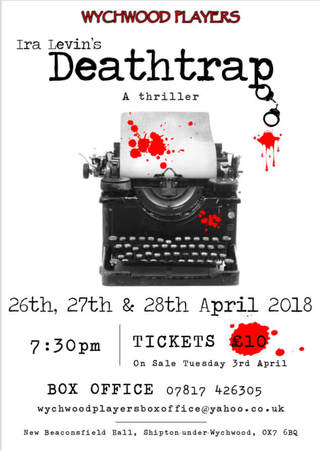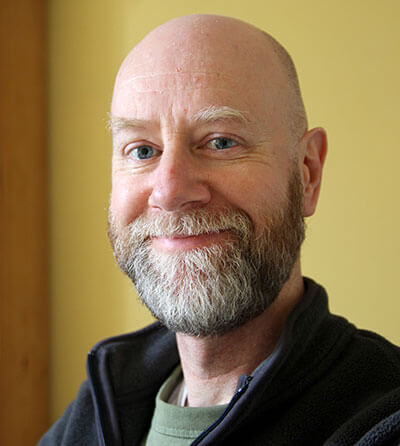|
DEATHTRAP by Ira Levin
Wychwood Players New Beaconsfield Hall, Station Road, Shipton-under-Wychwood, Oxfordshire, OX7 6BQ 26-28 April 2018 Deathtrap holds the record for the longest running show on Broadway, and its devious characters and plot twists and turns certainly draw in the audience, and keep them asking, 'What next?' Sidney Bruhl is a playwright of thrillers who has not had a hit in years. He receives a script in the post from Clifford Anderson, a student at one of his workshops, that has great commercial potential. Sidney tells his wife Myra that he is jealous and might just invite Clifford over to murder him and publish the script as his own. Clifford duly arrives, is apparently strangled by Sidney, much to Myra's consternation, and Sidney buries him in the garden. Later, Clifford, bloodied but not dead, bursts through the french windows and apparently batters Sidney to death. Myra is so shocked, she has a heart attack and dies. But Sidney is not dead – it has all been a plot between Sidney and Clifford to kill Myra. But suspicion and jealousy poison Sidney and Clifford's professional relationship, and twist follows twist, ending in each killing the other in a bloody climax. An extra layer is added to the play by Ira Levin, in that the play refers to itself as a play within a play. 'Deathtrap' is not only the title of the play we see, but of the script that Clifford originally sent Sidney, and again which Clifford starts to write after Myra's death. These plays within plays follow the plot of the main play that we, the audience, are watching. This is a show whose script does much of the heavy lifting, but the cast certainly added to the play's success on the evening I went to see it. Aram Gregory played Sidney Bruhl with a laconic drawl, relishing each joking, murderous reference to his wife Myra (Joanna McKerlie) for the chilling effect it had on her. Here was a man who never broke into a sweat, who had it all covered. Except he didn't, meeting his match in Clifford Anderson (Richard J Hartley convincing as student writer in awe of his hero Bruhl). Hartley was also heckled (in good humour) by friends of his in the audience, which could have demolished that fourth wall. Hartley and Gregory, however, carried on without cracking so much as a smile. Well done, chaps. Candida Richards had a peach of a cameo role as Helga Ten Dorp, the Dutch psychic who lives next door, and who has an inconvenient habit of predicting murders and other crimes in the vicinity, and feels called to come and warn Sidney about them. Candida played it up nicely, while resisting the temptation to milk it. Joanna McKerlie as Sidney's wife Myra is given a character to play who is mainly reactive and mainly uncomfortable with most of what is unfolding. She is a follower, not a leader. Joanna resisted the easy option of stock reactions and played each new development and provocative remark by Sidney in a fresh way. Her character certainly gave no justification for Sidney's bumping her off, other than an assumption that they had 'irreconcilable differences'. Finally, Ralph Wears appeared as Sidney's lawyer Porter Milgrim. Cool and laid back, Ralph played Porter as a professional who has developed an almost friendship with his client, and who is happy to tell it like it is, knowing all the while that he's charging by the quarter hour! Porter is the stiff in the suit, who doesn't fit into Bruhl's literary world, but actually quite enjoys dipping his toe in, before retreating to his urban legal world. Ben Curran and his helpers built a great set – one of those groovy apartments seen in American sitcoms of the 1970s – with an impressive array of weapons ancient and modern mounted on the walls. On such furniture-filled sets there are limited options in terms of movement by the actors, but director Julie Downing made the most of what she had. In any case, this was a dialogue heavy piece where the audience's attention was on following the lines of the actors to pick apart the clues, so a more sedentary style was appropriate. One unusual feature was the curtain call in which backstage crew and director took their bows as well. A nice touch. Wychwood Players have given us an assured production of a play that is something of a crowd pleaser. That doesn't mean that success is guaranteed. There are long, long speeches here that test the mettle of an actor in maintaining that narrative drive and emotional freshness through each scene. Julie Downing's band of players did not disappoint.
0 Comments
Leave a Reply. |
About the Author
Mike Lord has been involved with amateur theatre for over twenty years, mainly as an actor but also, more recently, as a director. Archives
July 2019
Contact me
Please use the Contact Form for anything apart from comments on blog posts. |


 RSS Feed
RSS Feed
